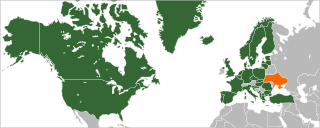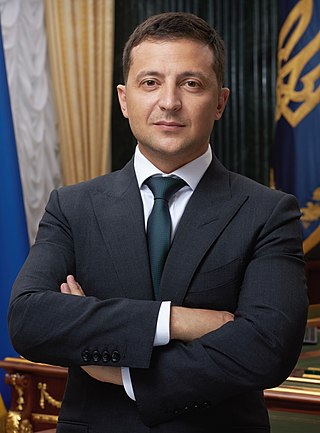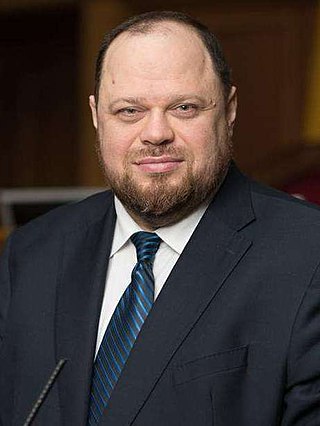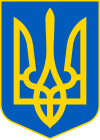The All-Ukrainian Union "Fatherland", referred to as Batkivshchyna, is a political party in Ukraine led by People's Deputy of Ukraine, former Ukrainian Prime Minister Yulia Tymoshenko. As the core party of the former Yulia Tymoshenko Bloc, Batkivshchyna has been represented in the Verkhovna Rada since Yulia Tymoshenko set up the parliamentary faction of the same name in March 1999. After the November 2011 banning of the participation of blocs of political parties in parliamentary elections, Batkivshchyna became a major force in Ukrainian politics independently.
European Solidarity is a political party in Ukraine. It has its roots in a parliamentary group called Solidarity dating from 2000 and has existed since in various forms as a political outlet for Petro Poroshenko. The party with its then name Petro Poroshenko Bloc won 132 of the 423 contested seats in the 2014 Ukrainian parliamentary election, more than any other party.

Petro Oleksiiovych Poroshenko is a Ukrainian oligarch and politician who served as the fifth president of Ukraine from 2014 to 2019.

International relations between the European Union (EU) and Ukraine are shaped through the Ukraine–European Union Association Agreement and the Deep and Comprehensive Free Trade Area (DCFTA). Ukraine is a priority partner within the Eastern Partnership and the European Neighbourhood Policy (ENP). The EU and Ukraine developed an increasingly close relationship, going beyond co-operation, to gradual economic integration and deepening of political co-operation. On 23 June 2022, the European Council granted Ukraine the status of a candidate for accession to the European Union.

Eastern Ukraine or east Ukraine is primarily the territory of Ukraine east of the Dnipro river, particularly Kharkiv, Luhansk and Donetsk oblasts (provinces). Dnipropetrovsk and Zaporizhzhia oblasts are often also regarded as "eastern Ukraine".

The Ukrainian Democratic Alliance for Reform of Vitali Klitschko is a political party in Ukraine headed by retired Ukrainian professional heavyweight boxer and the WBC world heavyweight champion emeritus Vitali Klitschko. The party has been an observer member of the European People's Party (EPP) since 2013.

Relations between Ukraine and the North Atlantic Treaty Organization (NATO) started in 1991 following Ukraine's independence after the dissolution of the Soviet Union. Ukraine-NATO ties gradually strengthened during the 1990s and 2000s, and Ukraine aimed to eventually join the alliance. Although co-operating with NATO, Ukraine remained a neutral country. After it was attacked by Russia in 2014, Ukraine has increasingly sought NATO membership.

Snap presidential elections were held in Ukraine on 25 May 2014 and resulted in Petro Poroshenko being elected President of Ukraine. Originally scheduled to take place on 29 March 2015, the date was brought forward following the 2014 Ukrainian revolution. Poroshenko won the elections with 55% of the vote, enough to win in a single round. His closest competitor, Yulia Tymoshenko, got 13% of the vote. The Central Election Commission reported voter turnout over 60%, excluding the regions not under government control. Since Poroshenko obtained an absolute majority in the first round, a run-off second ballot was unnecessary.

Andriy Volodymyrovych Parubiy is a Ukrainian politician who served as the Chairman of the Verkhovna Rada, the Ukrainian parliament, from 14 April 2016 to 29 August 2019. He previously served as Secretary of the National Security and Defence Council of Ukraine, appointed after the Euromaidan protests in the 2014 Ukrainian revolution, until his resignation on August 7, 2014.

On 28 February 2022, four days after it was invaded by Russia, Ukraine applied for membership of the European Union (EU). Ukrainian President Volodymyr Zelenskyy requested immediate admission under a "new special procedure", and the presidents of eight EU states called for an accelerated accession process. European Commission president Ursula von der Leyen stated that she supports Ukrainian accession, but that the process would take time. On 10 March 2022, the Council of the European Union asked the commission for its opinion on the application. On 8 April 2022, von der Leyen presented Zelenskyy with a legislative questionnaire, which Ukraine responded to on 9 May.

Revival is a political party in Ukraine, established in its current form in June 2015. Its predecessor had been founded by Heorhiy Kirpa in 2004.

From the end of February 2014, in the aftermath of the Euromaidan and the Revolution of Dignity, which resulted in the ousting of Russian-leaning Ukrainian President Viktor Yanukovych, demonstrations by Russian-backed, pro-Russian, and anti-government groups took place in Crimea, Donetsk, Luhansk, Kharkiv and Odesa. The unrest, which was supported by the Russian military and intelligence services, belongs to the early stages of the Russo-Ukrainian War.
The annexation of Crimea by the Russian Federation took place in the aftermath of the 2014 Ukrainian revolution. On 22–23 February, Russian President Vladimir Putin convened an all-night meeting with security services chiefs to discuss pullout of deposed President, Viktor Yanukovych, and at the end of that meeting Putin remarked that "we must start working on returning Crimea to Russia.". Russia sent in soldiers on February 27, 2014. Crimea held a referendum. According to official Russian and Crimean sources 95% voted to reunite with Russia. The legitimacy of the referendum has been questioned by the international community on both legal and procedural grounds.
The Union "Self Reliance" is a liberal conservative and Christian democratic political party in Ukraine.
The Opposition Bloc was a pro-Russian political party in Ukraine that was founded in 2014 by the merger of six parties that did not endorse Euromaidan. Legally, the party was created by renaming the lesser-known party "Leading Force". The party was perceived as the successor of the disbanded Party of Regions.

Presidential elections were held in Ukraine on 31 March 2019. As none of the 39 candidates on the ballot received an absolute majority of the initial vote, a runoff was held on 21 April between the top two vote-getters, Volodymyr Zelenskyy, a television personality, and Petro Poroshenko, the incumbent president. According to the Central Election Commission (CEC), Zelenskyy won the second round with 75% of the vote. The elections were recognized as free and fair by the Organization for Security and Co-operation in Europe.

Servant of the People is a liberal, centrist, pro-European political party in Ukraine.

Iryna Vasylivna Friz is a Ukrainian politician who was Minister of the then newly created Ministry for Veterans Affairs in the Groysman government from November 2018 until August 2019. She was elected into the Ukrainian Parliament in 2014 as a member of the Petro Poroshenko Bloc and in the 2019 Ukrainian parliamentary election for European Solidarity.

Opposition Bloc, formerly called Opposition Bloc — Party for Peace and Development until June 2019, was a Ukrainian political party that was founded in 2019. On 8 June 2022, the party was banned in court. The party officially ceased to exist on 25 July, due to not appealing the ban.

Ruslan Oleksiyovych Stefanchuk is a Ukrainian politician and lawyer serving as Chairman of the Verkhovna Rada since October 2021.















